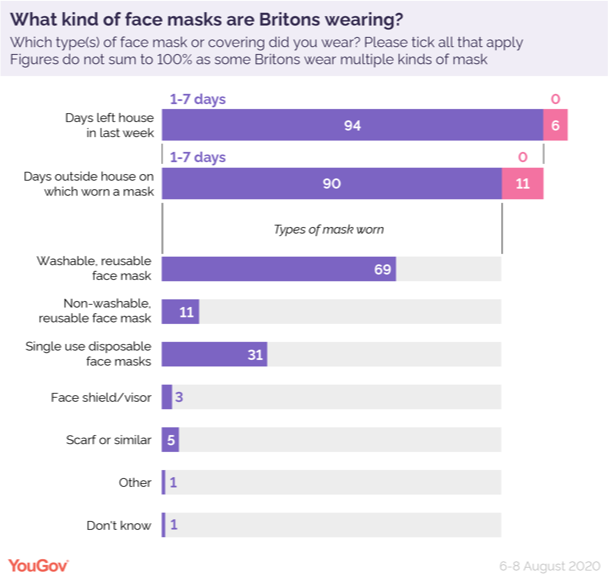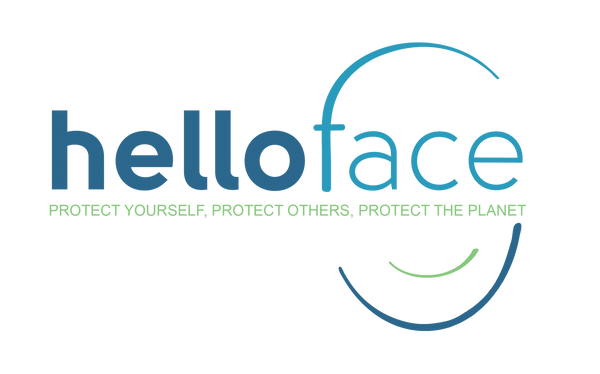The use of PPE in the UK has risen to an all-time high as a result of the Covid-19 pandemic sweeping the world. This surge of PPE includes disposable gloves, face masks, gowns and face shields and is not only restricted to the medical field. The current law in England states that a form of facial covering must be worn in all public enclosed spaces, this includes: supermarkets, public transport, banks, libraries and places of worship.
The rise in demand for all kinds of PPE will leave an imprint on the environment that will last forever, according to BBC News. With millions of gloves and masks being disposed of daily, it is unsurprising that the mass of Covid-19 waste is ending up in places where it shouldn’t, such as on our beaches and in our oceans.
The Guardian reported that discarded disposable PPE, including face masks and gloves, were found on 30% of beaches in the UK while volunteers were cleaning up.
Single-use PPE items pose a huge threat on the livelihood of wildlife, both on sea and inland, adding to the dangers that they may come across; whether it be becoming intertwined in the straps of a disposable face mask, or mistakenly eating non-biodegradable materials.
In response to the growing concern of the environment, people and businesses are beginning to take the steps needed in order to try and reverse this devastation.
Helloface have produced a recyclable, transparent face covering that is reusable for up to 30 times. Disposing of your Helloface covering after the intended usage is easy; simply contact your local authority to find out where your nearest recycling centre is and follow the measures to recycle correctly.
Though the current straps are not presently recyclable, Helloface are in discussions with brands and schemes to form a recycling partnership for new reusable straps.
Ben Thornbury, a teenager from Wiltshire, has been voluntarily cleaning up his town of Malmesbury for years. Together with his neighbour Julie, they both de-litter the streets and aim to make the town clean and accessible for the whole community.
Upon choosing to start cleaning up his town, Ben says, “I decided to start cleaning up my area of Malmesbury, Wiltshire four years ago”.
He continues, “My sixty-one-year-old neighbour, Julie, realised there was a hedge overgrown and wheelchairs couldn’t pass, so we went and sorted it out and ever since we have continued on with the group”.
Ben has been involved with many a clean-up over the years alongside fellow volunteers, however he recalls his biggest clean up.
In a clean-up around his local park Ben says, “There were tents and a whole den in the middle of absolutely nowhere where people had decided to create camps and bring bottles and wood back”.
Ben volunteers every day as he ventures out to clean his town. For him, cleaning can be as simple as picking up one piece of litter a day; unfortunately, this may rise as Ben has witnessed a climb in the number of littered items of PPE on the streets.
He tells us, “Ever since the mask policy in stores and places, the amount of PPE being littered has skyrocketed and I see masks dropped on the floor all the time now. I normally come back with them now in my rubbish bags, along with rubber gloves also being found consistently on the floor”.
Advocating the importance of recycling items of PPE, Ben describes how wildlife around us are getting tangled up in masks and sadly passing away. He says, “These masks are single-use plastics. They are entering our oceans and washing up on beaches and affecting marine life. Please recycle these items properly”.
“My advice to those who are discarding their masks and gloves on the floor is please play your part in protecting our environment and oceans”.
To view Ben’s portfolio and follow his blog, check out his website https://benthornbury.co.uk.
Many companies are beginning to re-evaluate their values, and prioritise sustainability at the core, Helloface included.
At Helloface, we have worked diligently to source materials that are recyclable and reusable, not limiting the face covering to one-use. As a local Hertfordshire business, Helloface coverings are designed and manufactured here in the UK, therefore lowering our carbon emissions.
WasteAware is a partnership between all ten districts and boroughs in Hertfordshire which aim to spread awareness of the importance of recycling and ensure that all Hertfordshire residents are aware of what, and where, to recycle their items of PPE.
Committed to reusing, reducing and recycling, decreasing single-use plastics is one of WasteAware’s key campaigns.
“We know from speaking to collection crews and at our monthly meetings that it [PPE litter] has anecdotally increased” says Claire, on behalf of WasteAware. “This is backed up by news reports and general litter picks”.
To get involved with WasteAware’s campaigns to decrease disposable plastic waste and support recycling, visit their website here: https://www.hertfordshire.gov.uk/services/recycling-waste-and-environment/recycling-and-waste/recycling-and-waste.aspx
The increase in waste due to the Covid-19 pandemic has ignited a retaliation in scientists and researchers who are aiming to tackle this rise.
The UCL Plastic Waste Innovation Hub consist of a great team of researchers, designers, engineers and more that are dedicating their time to tackle the issue of plastic waste.
Led by Professor Mark Miodownik, the Designing-out Plastic Waste project is the newest project that the team of researchers are involved in. This project is aimed at developing innovative ways to design-out plastic packaging waste and create new opportunities for businesses.
Dr Beth Munro, Research Manager of the Plastic Waste Innovation Hub, spoke to us about the inspiration of their newest project.
She said, “The Plastic Waste Innovation Hub was created to be the UCL home for these researches, and together we would take a systems design-led approach to investigating the problems of plastic waste”.
“We believe that waste is a failure of design: whether that is a failure to design plastics that are reusable, recyclable, or compostable”.
As a result of the Covid-19 outbreak, plastic wastage has risen greatly due to the mass increase in PPE items such as disposable gloves, single-use masks and plastic gowns.

Since the pandemic, Beth has told us that the interest in the project from members of the public and the media has grown profusely.
She said, “The Covid-19 pandemic came on the heels of David Attenborough’s fantastic Blue Planet 2 series which highlighted the plastics emergency in our oceans. Everyone was starting to get really committed to reducing and rejecting plastics in many forms (most notably in the plastic carry bag ban), and then the pandemic came”.
Beth continues, “Our use of single-use plastics went up once again, not only in the form of disposable PPE and face masks, but in hospital equipment and in packaging to keep our food safe when we knew little about how the virus was spreading”.
In terms of the effect on the environment that discarded PPE items are having, Beth says it is too early to be able to understand the full extent of the environmental impact, though research from the Plastic Waste Innovation Hub demonstrates some key findings.
Research shows that if an individual chose to wear reusable masks, over disposable coverings, 85% less waste would be generated. Furthermore, it would have a 3.5x lower impact on climate change and sustains 3.7x lower costs than disposable, single-use masks.
In reverse, if everyone in the UK used one disposable mask each day for a whole year, 124,000 tonnes of waste will be generated, 66,000 tonnes of which would be contaminated, unrecyclable waste.
On these figures, Beth said, “These differences are staggering. But our research also acknowledges that an improperly worn or cared for reusable mask could also put the wearer at increased risk of infection”.
“The choice of a reusable mask must be taken with good knowledge of mask care and use for it to both protect the wearer and the environment”.
Along with the UCL Plastic Waste Innovation Hub, many members of the public are beginning to turn to reusable products, especially in regard to face masks.
According to a poll conducted by YouGov, 69% of people were using reusable face masks, in comparison to only 31% who favoured single-use face masks.

For those who are interested in taking a more sustainable approach and opting for a reusable mask, rather than a disposable one, Dr Beth Munro recommends reusing plastics and other materials as a more sustainable choice.
“There are, of course, individual choices that people can make to reduce their reliance on single-use plastic and that these choices will have a positive environmental impact. In general, reusing as a strategy, for plastics and other materials, is an environmentally-friendly choice”.
However, Beth highlights the times where single-use PPE may be favoured over disposable items.
“The pandemic really highlights that we both require single-use plastic in some settings, like the hospital, and also single-use plastic may be perceived as more convenient or safe”.
Through the life-cycle assessment of plastics carried out by team on the Designing-out Plastic Waste project, Beth says, “People can choose to avoid or reuse single-use plastics, which is great, but they should also continue to demand change from their shops and government”.
To see out what Beth and the team are up to at the UCL Plastic Waste Innovation Hub, check out their website https://www.plasticwastehub.org.uk. Helloface masks are available to purchase on www.thehelloface.com.
